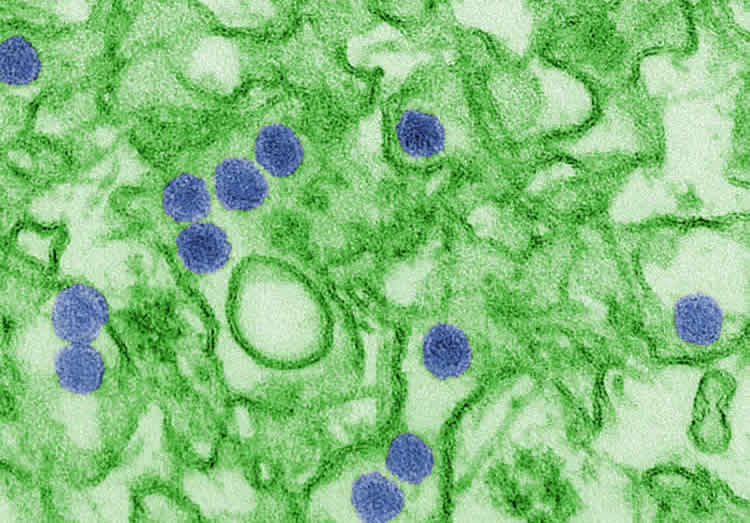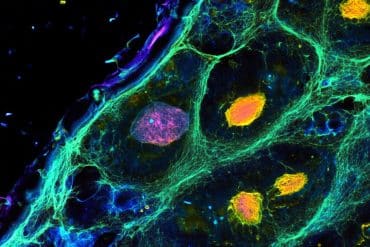Summary: According to researchers, three anti-influenza compounds also appear to be able to inhibit Zika virus infection.
Source: University of Helsinki.
Researchers from the University of Helsinki have shown that three anti-influenza compounds effectively inhibit Zika virus infection in human cells. The results provide the foundation for development of the broad-spectrum cell-directed antivirals or their combinations for treatment of Zika and other emerging viral diseases.
Globalization, environmental changes, population growth and urbanization make emerging virus diseases a major threat to public health. An example of such epidemics is the Zika outbreak which is ongoing in the Americas after emerging in the Pacific region.
Zika infection associated with congenital brain abnormalities is one of the eleven virus diseases that, according to World Health Organization, needs urgent research and drug development attention. At the moment, there are no approved therapies for Zika infection.
Several host cell targets are needed for replication of influenza and many other viruses. In contrast to viral proteins, the host targets are less prone to mutations and thus drugs targeting them could be more effective against viruses, which mutate easily.
A team led by Dr. Denis Kainov from the Institute for Molecular Medicine Finland (FIMM) and Professor Olli Vapalahti from the Departments of Virology and Veterinary Biosciences, from the University of Helsinki, decided to adopt this approach to test cell-directed compounds for treatment of Zika. In their recent study, published online in the Antiviral Research journal, the researchers showed that antivirals which block influenza virus by targeting host cell factors are also able to inhibit Zika virus infection.
The multinational research group utilized a model system where human retinal pigment epithelial cells were infected with Zika virus strain they isolated earlier from fetal brain. They were able to show that treatment of the cells with three drugs, called obatoclax, saliphenylhalamide and gemcitabine, prevented synthesis of viral building blocks and production of new viruses at concentrations that are not toxic to cells.

“Our results show that these antiviral drugs and their combinations are potent inhibitors of Zika virus-host cell interaction. Furthermore, the results broaden the spectrum of antiviral activity of these compounds and shed new light on their mechanisms of action,” said Dr. Kainov.
“Importantly, the findings of the study demonstrate that re-purposing commercially available, approved drugs or drug candidates may accelerate development of treatment against Zika and can provide a toolbox to target also other emerging viral diseases,” Prof. Vapalahti added.
Source: University of Helsinki
Image Source: NeuroscienceNews.com image is in the public domain.
Original Research: Abstract for “Obatoclax, saliphenylhalamide and gemcitabine inhibit Zika virus infection in vitro and differentially affect cellular signaling, transcription and metabolism” by Suvi Kuivanen, Maxim M. Bespalov, Jatin Nandania, Aleksandr Ianevski, Vidya Velagapudi, Jef K. De Brabander, Denis E. Kainov, and Olli Vapalahti in Antiviral Research. Published online December 31 2016 doi:10.1016/j.antiviral.2016.16.022
[cbtabs][cbtab title=”MLA”]University of Helsinki “Certain Anti-Influenza Compounds Also Inhibit Zika Infection.” NeuroscienceNews. NeuroscienceNews, 16 January 2017.
<https://neurosciencenews.com/influenza-zika-compound-5943/>.[/cbtab][cbtab title=”APA”]University of Helsinki (2017, January 16). Certain Anti-Influenza Compounds Also Inhibit Zika Infection. NeuroscienceNew. Retrieved January 16, 2017 from https://neurosciencenews.com/influenza-zika-compound-5943/[/cbtab][cbtab title=”Chicago”]University of Helsinki “Certain Anti-Influenza Compounds Also Inhibit Zika Infection.” https://neurosciencenews.com/influenza-zika-compound-5943/ (accessed January 16, 2017).[/cbtab][/cbtabs]
Abstract
Obatoclax, saliphenylhalamide and gemcitabine inhibit Zika virus infection in vitro and differentially affect cellular signaling, transcription and metabolism
An epidemic of Zika virus (ZIKV) infection associated with congenital abnormalities such as microcephaly, is ongoing in the Americas and the Pacific. Currently there are no approved therapies to treat this emerging viral disease. Here, we tested three cell-directed broad-spectrum antiviral compounds against ZIKV replication using human retinal pigment epithelial (RPE) cells and a low-passage ZIKV strain isolated from fetal brain. We found that obatoclax, SaliPhe, and gemcitabine inhibited ZIKV infections at noncytotoxic concentrations. Moreover, all three compounds prevented production of viral RNA and proteins as well as activation of cellular caspase 8, 3 and 7. However, these compounds differentially affected ZIKV-mediated transcription, translation and posttranslational modifications of cellular factors as well as metabolic pathways indicating that these agents possess different mechanisms of action. Interestingly, combination of obatoclax and SaliPhe at nanomolar concentrations had a synergistic effect against ZIKV infection. Thus, our results provided the foundation for development of broad-spectrum cell-directed antivirals or their combinations for treatment of ZIKV and other emerging viral diseases.
“Obatoclax, saliphenylhalamide and gemcitabine inhibit Zika virus infection in vitro and differentially affect cellular signaling, transcription and metabolism” by Suvi Kuivanen, Maxim M. Bespalov, Jatin Nandania, Aleksandr Ianevski, Vidya Velagapudi, Jef K. De Brabander, Denis E. Kainov, and Olli Vapalahti in Antiviral Research. Published online December 31 2016 doi:10.1016/j.antiviral.2016.16.022






